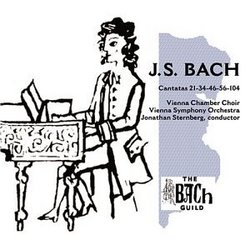| All Artists: Johann Sebastian Bach, Jonathan Sternberg, Vienna Symphony Orchestra, Kurt Rapf, Rosl Schwaiger, Hugues Cuénod Title: J.S. Bach: Cantatas 21, 34, 46, 56, 104 Members Wishing: 0 Total Copies: 0 Label: Vanguard Classics Original Release Date: 1/1/2000 Re-Release Date: 10/21/2003 Genre: Classical Styles: Opera & Classical Vocal, Historical Periods, Baroque (c.1600-1750) Number of Discs: 2 SwapaCD Credits: 2 UPC: 699675124120 |
Search - Johann Sebastian Bach, Jonathan Sternberg, Vienna Symphony Orchestra :: J.S. Bach: Cantatas 21, 34, 46, 56, 104
 | Johann Sebastian Bach, Jonathan Sternberg, Vienna Symphony Orchestra J.S. Bach: Cantatas 21, 34, 46, 56, 104 Genre: Classical
|
Larger Image |
CD Details |
CD ReviewsBeautifully Performed Bach 01/07/2004 (4 out of 5 stars) "What a pleasure to hear Bach Cantatas performed with such simplicity and beauty and no-nonsense authenticity. The chorus sings with much love and as if they really understood the text. Rare ! The orchestra plays with a pure sound and sensitive regard for dynamics and the vocal soloists are quite exceptional. Of particular note is the tenor Hugues Cuenod whose rendition of the various arias is without doubt unique in it's sense of Baroque style. And finally the conducting of Jonathan Sternberg whose conception of Bach and organization of the whole into beautiful interpretations is worthy of great praise. A must for Bach lovers." Superlative Bach from the Dawn of the LP Era Johannes Climacus | Beverly, Massachusetts | 09/08/2008 (5 out of 5 stars) "In 1950, Vanguard Records launched its highly esteemed Bach Guild label with a series of cantatas by the Leipzig Cantor under the direction of Jonathan Sternberg, an American early music specialist. I'm not aware that Sternberg recorded anything else, which is a pity, since, on the evidence heard in this historic reissue, he was an extraordinary Bach interpreter.
One of my fondest childhood memories is hearing Sternberg's account of BWV 21, "Ich hatte viel Bekümmernis" on an ancient Bach Guild LP from my father's collection. I had no idea what I was hearing--no text was supplied with the album, and I was utterly unfamiliar with Bach's compositional techniques--yet I remember being profoundly moved by the mysterious sounds emanating from the grooves of that vinyl disc. Later, after attaining musical literacy, I saved up my weekly allowance to purchase my own copy of BWV 21 and then went on to obtain further Bach Guild recordings, including the other Sternberg-conducted cantatas. My judgment is thus perhaps clouded by nostalgia. Nevertheless, I think a case can be made on objective grounds that these pathbreaking Bach recordings are among the very best of their generation. Sternberg clearly had a sound understanding of late Baroque performance practice, as well as a deep affinity for the music of Bach. His pacing is almost always exactly right: In BWV 21, for instance, he takes the opening chorus at a brisker tempo than usual, thereby giving the music a dramatic urgency it lacks in most other performances I have heard (including recent period-instrument versions). On the other hand he gives the arias and duets plenty of space to breathe, and the contemplative qualities in the music blossom accordingly (as in the great bass aria apostrophizing Jesus as Good Shepherd from BWV 104). He conveys crackling excitement elsewhere, as in the choral fireworks that conclude BWV 21 or the celebratory opening chorus of BWV 34. Bach Guild went all out to secure a fine roster of soloists in these inaugural issues. Though with one exception (Hughes Cuenod), their names are virtually unknown today, these artists give throughly idiomatic and sensitive renditions of their respective solos. Cuenod gives a predictably riveting account of his stormy aria in Part I of BWV 21, and an ecstatic rendition of the joyful one in Part II. Pernerstorfer and Schwaiger turn in a memorable performance of their sublime duet in the same cantata. Pernerstorfer also acquits himself admirably in the demanding "Kreuzstab" cantata, BWV 56, even if he has latterly acquired some rather fierce competition from the likes of Fischer-Dieskau and Quasthoff, among many others. The modest-sized choir sings heartily, with good articulation, alert rhythms and generally crisp diction. They toss off their roulades effortlessly in the complex choral structures of BWV 21 and 34, while producing a finely-spun legato in the opening lamentation of BWV 46 (which later became the "Qui tollis peccata mundi" of the B-minor Mass) and the heavenly pastoral meditation with which BWV 104 begins. The only quibble concerns vibrato; by today's early-music standards this choir's collective tone is on the fruity side, even if that affords expressive opportunities denied to more musicologically correct singing. Sternberg's ensemble presumably play on modern instruments, though they produce an appropriately lean tone. The all-important oboe obbligati in BWV 21 and elsewhere are imaginatively and expressively phrased. The continuo realizations tend to be somewhat self-effacing and rhythmically square (as they tended to be in 1950), though the instruments themselves--a plangent harpsichord and unobtrusive positiv organ--sound authentic enough and are appropriately, if rather dully, registered. Perhaps the best news is that the warm ambience of the sound on the original LPs has been preserved, while clarity of focus has been enhanced by digital remastering. Within the confines of monaural, the sound is pleasingly natural, even though one might wish for the enhanced sense of perspective which stereo would ultimately provide. At times, as in some of the busier choral movements and denser contrapuntal passages, the texture can become cloudy. In any case this reissue is not being marketed to the audiophile crowd but to those who enjoy exploring historical recordings and the evolution of Baroque performance practice in the 20th century. For such listeners--and for any, such as the present reviewer, for whom nostalgia might dictate a revisiting of the first Bach Guild recordings--this inexpensive double-CD set will be a welcome trip down memory lane." |

 Track Listings (16) - Disc #1
Track Listings (16) - Disc #1